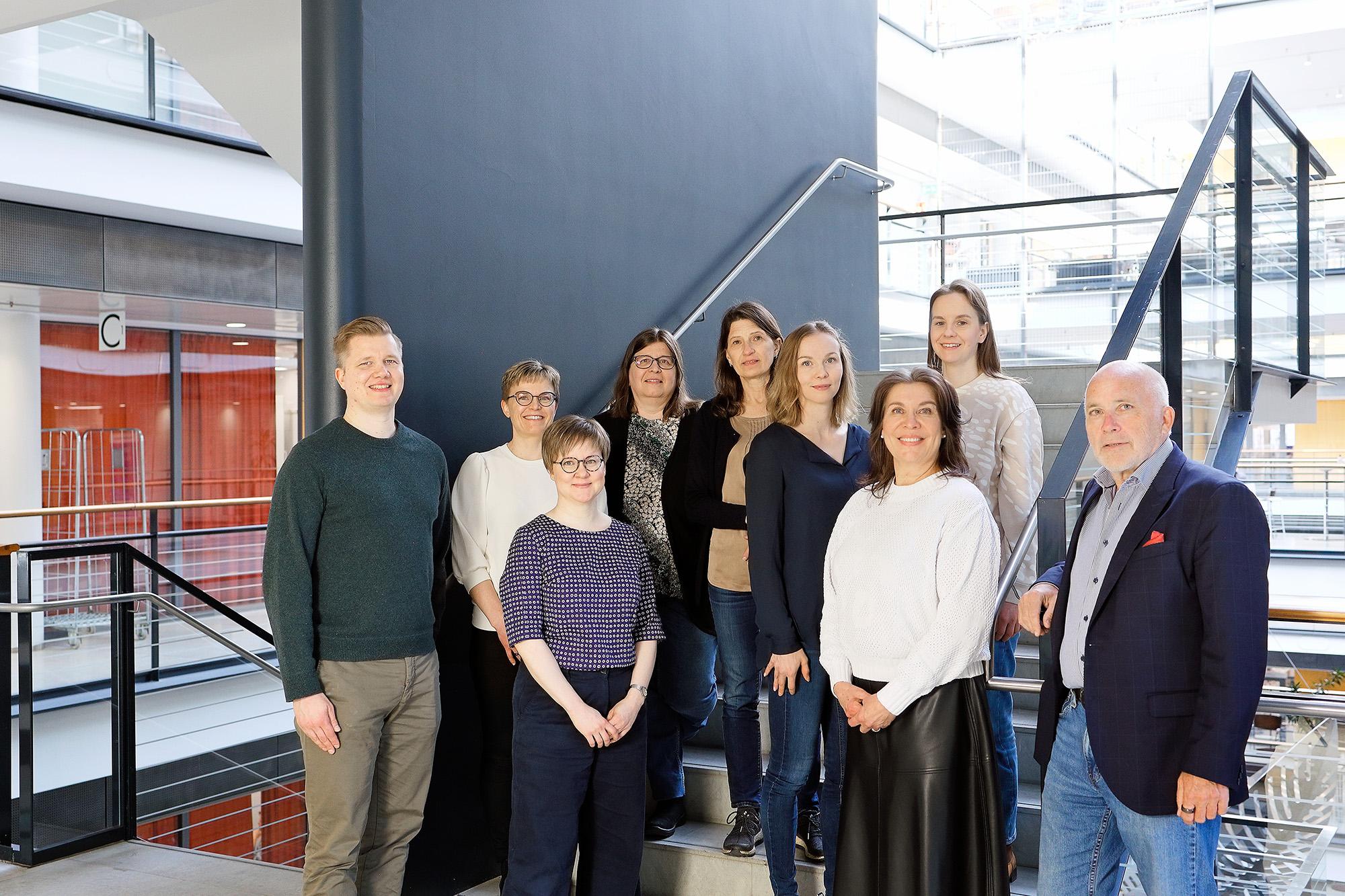Life Cycle Research

Our research
According to the DOHaD hypothesis non-optimal early life conditions are associated with an increased risk for several non-communicable diseases.

The Helsinki Birth Cohort Study
The Helsinki Birth Cohort Study (HBCS) has primarily been focusing on the importance of factors active in early life and their effect on later health in two study cohorts including 20,431 people born 1924–44. Our main study cohort consists of 13345 people born 1934–44 in Helsinki. The cohort is a longitudinal study cohort with data throughout the life span including prenatal life, early childhood and later life. Besides extensive epidemiological data over 2000 subjects have been randomly selected for a clinical part. The subjects have been followed up clinically for over two decades with extensive phenotypic data available including metabolic data, dietary information as well as other lifestyle data. Psychological factors including personality, depression and anxiety has been focused upon. A GWAS has been performed on the HBCS. One primary aim of HBCS is to assess how growth and environmental factors acting during early life are related to health in adult life. Besides taking into account early life factors, socioeconomic and adult lifestyle factors are also considered, as well as genetic factors. In other words, health and disease are focused upon from a life course perspective. Our particular focus has been to study the early life origins of cardiovascular disease and its risk factors, cognitive function, psychological and behavioral outcomes as well as aging-related processes. As the study cohort is aging our more recent focus has been on healthy aging and healthy longevity from a life course perspective.
To summarise, we have shown that early growth patterns are associated with several health outcomes including coronary heart disease and type 2 diabetes as well as mental health outcomes. The long-term health impact of maternal adiposity during pregnancy has also been studied. We have been assessing potential underlying factors explaining the described associations and these include genetic and epigenetic factors. Several non-communicable diseases have their origins in early life therefore optimizing the health of women of reproductive age will have positive consequences for their offspring. One overview of findings in HBCS over the past 20 years has been published in Annals of Medicine 2016 Sep;48(6):456-467. There are over 200 peer-reviewed scientific publications based on findings from HBCS and the study is still ongoing. Our findings have attracted great global interest from agencies including WHO and NIH and been including in several recommendations.
Read more
Group Leader
Senior Scientists
Hannu Kautiainen
Prakash K.C.
Jari Lahti
Merja Laine
Tuija Mikkola, Administrative Leader
Niko Wasenius
Scientist
Doctoral Researchers
Simon Biaudet
Mathias Lundström
Anni Malmberg
Samuli Palmu
Katri Ruutu
Staff
Emilia Keijonen
Sigrid Rostén
Catch-up growth in childhood and death form coronary heart disease: longitudinal study.
Eriksson JG, Forsen T, Tuomilehto J, Winter PD, Osmond C, Barker DJ. BMJ. 1999.
Early growth and coronary heart disease in later life: longitudinal study.
Eriksson JG, Forsén T, Tuomilehto J, Osmond C, Barker DJP. BMJ. 2001.
Trajectories of growth among children who later have coronary event.
Barker DJP, Osmond C, Forsen TJ, Kajantie E, Eriksson JG. New England Journal of Medicine. 2005.
Higher serum phenylalanine concentration is associated with more rapid telomere shortening in men.
Eriksson JG, Guzzardi MA, Iozzo P, Kajantie E, Kautiainen H, Salonen MK. The American Journal of Clinical Nutrition. 2017.
Maternal adiposity in pregnancy and offspring asthma in adulthood.
Westberg AP, Salonen MK, von Bonsdorff M, Osmond C, Kajantie E, Eriksson JG. European Respiratory Journal. 2018.
Physical heaviness of work and sitting at work as predictors of mortality: a 26-year follow-up of the Helsinki Birth Cohort Study.
Mikkola TM, von Bonsdorff MB, Salonen MK, Kautiainen H, Ala-Mursula L, Solovieva S, Viikari-Juntura E, Eriksson JG. BMJ Open. 2019.
Possible Modifiers of the Association Between Change in Weight Status From Child Through Adult Ages and Later Risk of Type 2 Diabetes.
Bjerregaard LG, Wasenius N, Nedelec R, Gjærde LK, Ängquist L, Herzig KH, Jensen GB, Mortensen EL, Osler M, Overvad K, Skaaby T, Tjønneland A, Sørensen TIA, Järvelin MR, Eriksson JG, Sebert S, Baker JL. Diabetes Care. 2020.
Healthy ageing from birth to age 84 years in the Helsinki Birth Cohort Study, Finland: a longitudinal study.
Mikkola TM, Kautiainen H, von Bonsdorff MB, Wasenius NS, Salonen MK, Haapanen MJ, Kajantie E, Eriksson JG. Lancet Healthy Longevity. 2023.
Programming of cardiac metabolism by miR-15b-5p, a miRNA released in cardiac extracellular vesicles following ischemia-reperfusion injury.
Pantaleão LC, Loche E, Fernandez-Twinn DS, Dearden L, Córdova-Casanova A, Osmond C, Salonen MK, Kajantie E, Niu Y, de Almeida-Faria J, Thackray BD, Mikkola TM, Giussani DA, Murray AJ, Bushell M, Eriksson JG, Ozanne SE. Molecular Metabolism. 2024.
Associations Between Leisure-Time Physical Activity and Metabolomics-Based Markers of Biological Aging in Late Midlife: Short-Term and Long-Term Follow-Up.
Ruutu K, Wasenius NS, Narasimhan K, Mikkola TM, Laine MK, Eriksson JG. Aging Cell. 2025.
Päivi Korhonen, Finland, Professor
Eero Kajantie, Finland, Professor
Aarno Palotie, Finland, Professor
Timo Strandberg, Finland, Professor
Pertti Tienari, Finland, Professor
Sue Ozanne, UK, Professor
Marjo-Riitta Järvelin, UK, Professor
Patricia Silveira, Canada, Professor
Kothandaraman Narasimhan, Singapore
Batty David, UK, Professor
Samfundet Folkhälsan
Finska Läkaresällskapet (“Medical Society of Finland”)
Medicinska Understödsföreningen Liv och Hälsa (“Life and Health Medical Fund”)
Gyllenberg Foundation
Juho Vaino Foundation
Kort om studien på svenska
Projektet som leds av professor Johan Eriksson fokuserar på hälsan ur ett livscykelperspektiv. Vi har följt upp 13 345 personer födda 1934–44 och studerat hur faktorer tidigt i livsskedet påverkar hälsan senare i livet.
HBCS-tutkimuksesta suomeksi
Helsingin syntymäkohorttitutkimuksen (HBCS) päämääränä on selvittää, miten sikiökauden ja lapsuuden kasvu ja olosuhteet vaikuttavat aikuisiän terveydentilaan. Tutkimuksesta käytetään myös nimeä IDEFIX.
DeMoD
Maternal type 1 diabetes (T1D) increases the risk for pregnancy and birth complications and offspring risk for adverse health outcomes. In pregnancies complicated with T1D, high erythropoietin concentrations in amniotic fluid and fetal plasma reflecting fetal oxygen deficiency may explain adverse health outcomes among the offspring. In 2017, we initiated the study: Developmental origins of adult health in offspring of mothers with type 1 diabetes (DeMoD).
Our aim is to investigate:
- Whether high erythropoietin concentrations in amniotic fluid and fetal plasma among the offspring of women with T1D are associated with offspring health 18-23 years later. The study cohort consists of the offspring born to women with T1D and with measured erythropoietin concentration (n=273) and their matched controls (n=273). The study subjects will be studied clinically (physical examination, health questionnaires, blood and urinary samples, ECG, pulse wave velocity, measurements of advanced glycation end products, actigraphy, and cognitive tests).
- Whether there are differences in health outcomes, based on national healthcare registry data, between the offspring of women with T1D (n=1762) compared with matched offspring of women without T1D (n=8810) during a 16-year follow-up.
Research projects

Morbidity in Finnish Caregivers
The project studies somatic and psychiatric morbidity in family caregivers.

Healthy Learning Mind
The Healthy Learning Mind is a health promotion project encompassing both research and development project.

XAGE – Exercise and Aging
The XAGE study aims to investigate how physical exercise affects aging in 50–70-year-old adults.

